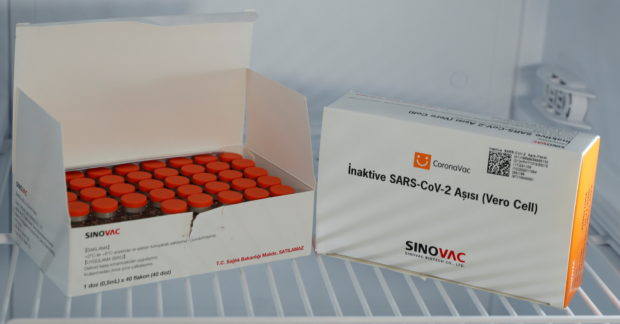Sinovac’s local sponsor confident China vaccine trials will pass PH standards

Boxes of the Sinovac’s CoronaVac Covid-19 vaccine are pictured in a refrigerator at the Sancaktepe Sehit Dr. Ilhan Varank Training and Research Hospital in Istanbul, Turkey January 14, 2021. REUTERS/Murad Sezer
MANILA, Philippines — IP Biotech, the local firm sponsoring clinical tests for Sinovac Biotech’s Covid-19 vaccine in the country, is confident that the CoronaVac trials will pass Philippine regulators’ standards.
“We are confident that the Philippine CoronaVac will pass these clinical trials and confirm the exceptional safety of Sinovac’s COVID-19 vaccines with more than satisfactory results,” Dr. Noel Miranda, IP Biotech scientific team member, said in a statement on Wednesday.
Miranda is also the former Asean Regional Coordinator for multi-sectoral pandemic response.
“Finally, with the Philippine clinical trials, we will be able to generate data that will help facilitate emergency public health decisions. The health and welfare of our families are at stake if we make misinformed and unfounded decisions during this crucial moment in history,” he added.
The IP Biotech commercial director, Carlos Garrucho, likewise asserted that, despite rumors against Sinovac’s CoronaVac, the vaccine “uses a time-tested and medically-proven approach to vaccination.”
Article continues after this advertisementAccording to the firm, CoronaVac is an inactivated whole-virion vaccine — “which means it was produced based on a proven traditional platform used for many other vaccines that have been administered to millions of people globally, in both infants and the elderly.”
Article continues after this advertisementGarrucho noted that a tropical country like the Philippines would not have difficulty storing Sinovac’s vaccine since ordinary freezers would be enough to keep them fresh.
IP Biotech said CoronaVac could be stored in standard refrigerator temperatures of 2º to 8ºC.
As Sinovac’s local sponsor in the CoronaVac clinical trials in the Philippines, IP Biotech will be responsible for shouldering the financial expenses of vaccine tests.
IP Biotech representatives also told INQUIRER.net that the company would be the sole distributor of CoronaVac to private markets in the country.
CoronaVac clinical trials are set to take place in the first quarter of 2021, after the Philippine Food and Drug Administration (FDA) granted Sinovac’s request. IP Biotech said the study will be a “randomized, double-blind, placebo-controlled clinical trial.”
It added that included in the approved parameters for its trial is a sample population of senior citizens between 60 and 80 years old.
“The FDA-approved detailed trial protocol adhering to strict ethical and safety standards will be used to ensure accurate and unbiased results,” IP Biotech assured.
While the government has expressed confidence in Sinovac’s vaccine — making it one of the vaccines that the national government would procure for its national vaccination drive — officials and several concerned citizens questioned whether the jab from China would be the right choice.
Senator Panfilo Lacson mentioned last Sunday that there was a high discrepancy between the selling prices of Sinovac in the Philippines and in other countries, saying that it costs around $5 or around P240 per dose in some instances, but it goes for around $38 or around P1,800 in the country.
READ: Varying prices of Sinovac COVID-19 vaccine raise alarm
Inter-Agency Task Force on Emerging Infectious Diseases (IATF) chief implementer and vaccine czar Secretary Carlito Galvez said they cannot fully reveal vaccine prices due to a non-disclosure agreement, although he said the price of Sinovac vaccine would not go over P700.
READ: Angara clarifies: Data on prices of Covid-19 vaccines came from DOH
Aside from its alleged high price, the efficacy of Sinovac’s CoronaVac is likewise being questioned by lawmakers and some sectors. This, after Brazil’s tests have shown that it only has a 50 percent efficacy rate although trials in Turkey and Indonesia reveal higher efficacy scores.
READ: What’s behind varying efficacy data for Sinovac’s COVID vaccine?
Nevertheless, the Department of Health has said that a 50 percent efficacy rate of a vaccine is acceptable, citing the minimum standard set by the World Health Organization.